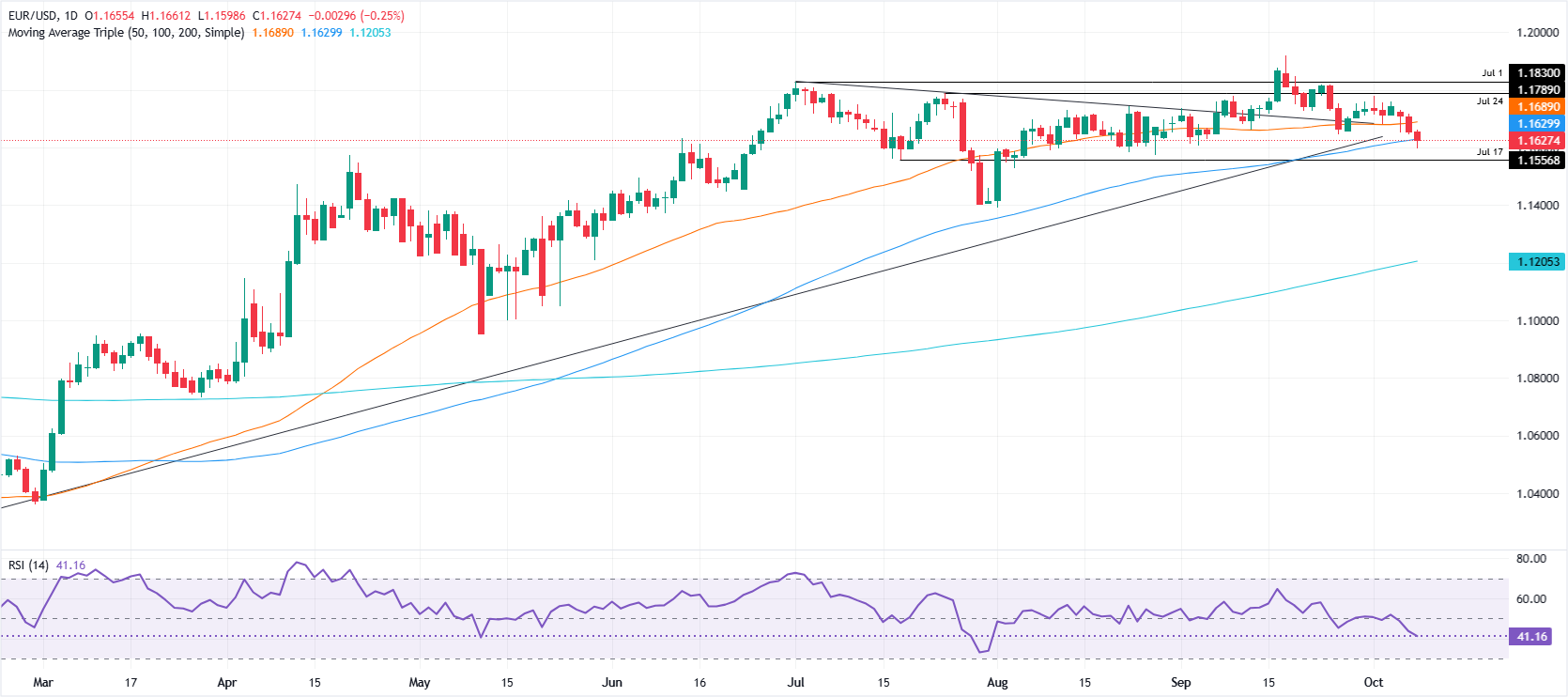Created
: 2025.10.09














![]() 2025.10.09 06:29
2025.10.09 06:29
EUR/USD extends its losses for three straight consecutive days, down 0.32% as the US government shutdown extends, and the Federal Reserve's last meeting minutes showed that officials remain cautious on inflation, despite easing policy. At the time of writing, the pair trades at 1.1622 after hitting a daily high of 1.1661.
Euro's weakness is mainly sponsored by the French political turmoil as the outgoing Prime Minister Sebastien Lecornu revealed there have been progress in negotiations with parliamentary groups and that President Macron could be able to name a new PM in 48 hours.
Aside from this, the Fed minutes showed that policymakers were willing to cut rates further this year, but many expressed concerns over inflation. The minutes revealed that "Most participants observed that it was appropriate to move the target range for the federal funds rate toward a more neutral setting because they judged that downside risks to employment had increased."
Data-wise, the US economic docket remains absent but in Europe, German Industrial Production data plunged by 4.3% MoM stoking fears of recession in the largest economy of the bloc.
Ahead this week, the Eurozone schedule will feature Germany's Trade Balance, the European Central Bank last meeting minutes and a speech by its Chief Economist Philip Lane. In the US, Federal Reserve Chair Jerome Powell will cross the wires, followed by Governors Michelle Bowman, Michael Barr and Minneapolis Fed President Neel Kashkari.
French Prime Minister Sébastien Lecornu said there is room for compromise in parliament, noting that an absolute majority in the National Assembly opposes a new dissolution. Lecornu informed President Emmanuel Macron that the likelihood of dissolution is diminishing and that current conditions should allow the appointment of a new prime minister within the next 48 hours.
The Fed Minutes revealed policymakers' debate over the response to changing risks, while most officials warned about inflation, despite acknowledging job market risks. Officials were worried about protecting the labor market and favored easing policy "further over the remainder of this year."
Fed policymakers are evenly split regarding the fed funds rate, with nine of them favoring two cuts and Stephen Miren eyeing several more, while the remaining nine projecting one one or no further rate cuts.
Money markets indicate that the Fed will cut interest rates by 25 basis points (bps) at the upcoming October 29 meeting. The odds stand at 94%, according to the Prime Market Terminal interest rate probability tool.
The EUR/USD is neutral to downward biased, yet it remains above the 1.1600 print, which keeps the chances of trading within the 1.1600-1.1700 range. The Relative Strength Index (RSI) shows turned bearish, a sign that sellers are gathering momentum.
If EUR/USD drops below 1.1600, the n ext support would be the August 27 swing low at 1.1574, followed by August 1 cycle low at 1.1391. On the upside, the EUR/USD first resistance would be 1.1700. The next key resistance areas would be 1.1760, 1.1800 and the July 1 high of 1.1830.

The Euro is the currency for the 19 European Union countries that belong to the Eurozone. It is the second most heavily traded currency in the world behind the US Dollar. In 2022, it accounted for 31% of all foreign exchange transactions, with an average daily turnover of over $2.2 trillion a day. EUR/USD is the most heavily traded currency pair in the world, accounting for an estimated 30% off all transactions, followed by EUR/JPY (4%), EUR/GBP (3%) and EUR/AUD (2%).
The European Central Bank (ECB) in Frankfurt, Germany, is the reserve bank for the Eurozone. The ECB sets interest rates and manages monetary policy. The ECB's primary mandate is to maintain price stability, which means either controlling inflation or stimulating growth. Its primary tool is the raising or lowering of interest rates. Relatively high interest rates - or the expectation of higher rates - will usually benefit the Euro and vice versa. The ECB Governing Council makes monetary policy decisions at meetings held eight times a year. Decisions are made by heads of the Eurozone national banks and six permanent members, including the President of the ECB, Christine Lagarde.
Eurozone inflation data, measured by the Harmonized Index of Consumer Prices (HICP), is an important econometric for the Euro. If inflation rises more than expected, especially if above the ECB's 2% target, it obliges the ECB to raise interest rates to bring it back under control. Relatively high interest rates compared to its counterparts will usually benefit the Euro, as it makes the region more attractive as a place for global investors to park their money.
Data releases gauge the health of the economy and can impact on the Euro. Indicators such as GDP, Manufacturing and Services PMIs, employment, and consumer sentiment surveys can all influence the direction of the single currency. A strong economy is good for the Euro. Not only does it attract more foreign investment but it may encourage the ECB to put up interest rates, which will directly strengthen the Euro. Otherwise, if economic data is weak, the Euro is likely to fall. Economic data for the four largest economies in the euro area (Germany, France, Italy and Spain) are especially significant, as they account for 75% of the Eurozone's economy.
Another significant data release for the Euro is the Trade Balance. This indicator measures the difference between what a country earns from its exports and what it spends on imports over a given period. If a country produces highly sought after exports then its currency will gain in value purely from the extra demand created from foreign buyers seeking to purchase these goods. Therefore, a positive net Trade Balance strengthens a currency and vice versa for a negative balance.
![]()
Created
: 2025.10.09
![]()
Last updated
: 2025.10.09

FXStreet is a forex information website, delivering market analysis and news articles 24/7.
It features a number of articles contributed by well-known analysts, in addition to the ones by its editorial team.
Founded in 2000 by Francesc Riverola, a Spanish economist, it has grown to become a world-renowned information website.
We hope you find this article useful. Any comments or suggestions will be greatly appreciated.
We are also looking for writers with extensive experience in forex and crypto to join us.
please contact us at [email protected].
Disclaimer:
All information and content provided on this website is provided for informational purposes only and is not intended to solicit any investment. Although all efforts are made in order to ensure that the information is correct, no guarantee is provided for the accuracy of any content on this website. Any decision made shall be the responsibility of the investor and Myforex does not take any responsibility whatsoever regarding the use of any information provided herein.
The content provided on this website belongs to Myforex and, where stated, the relevant licensors. All rights are reserved by Myforex and the relevant licensors, and no content of this website, whether in full or in part, shall be copied or displayed elsewhere without the explicit written permission of the relevant copyright holder. If you wish to use any part of the content provided on this website, please ensure that you contact Myforex.
Myforex uses cookies to improve the convenience and functionality of this website. This website may include cookies not only by us but also by third parties (advertisers, log analysts, etc.) for the purpose of tracking the activities of users. Cookie policy